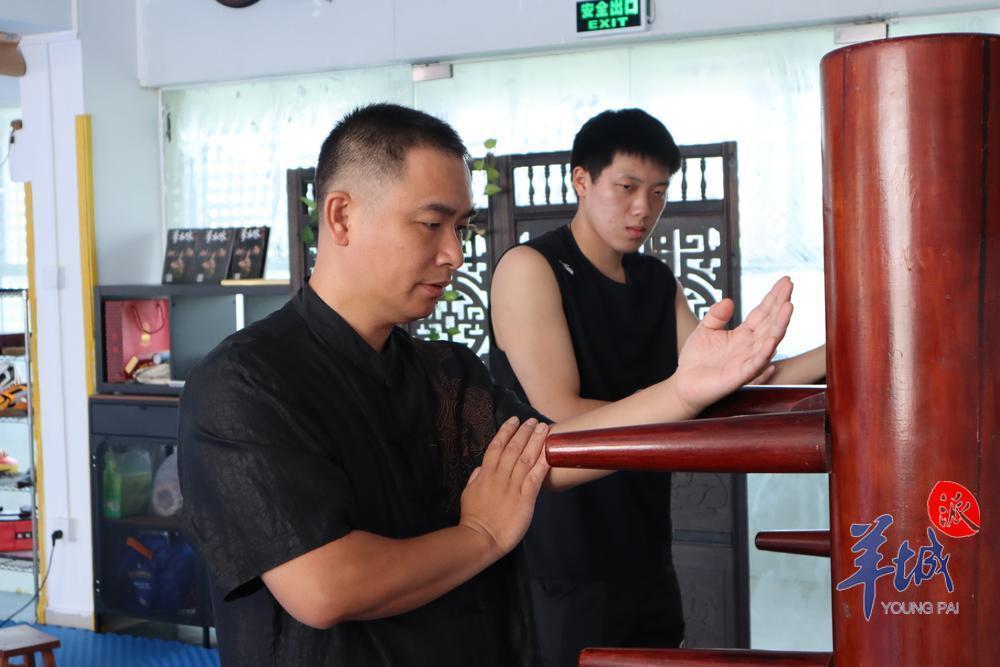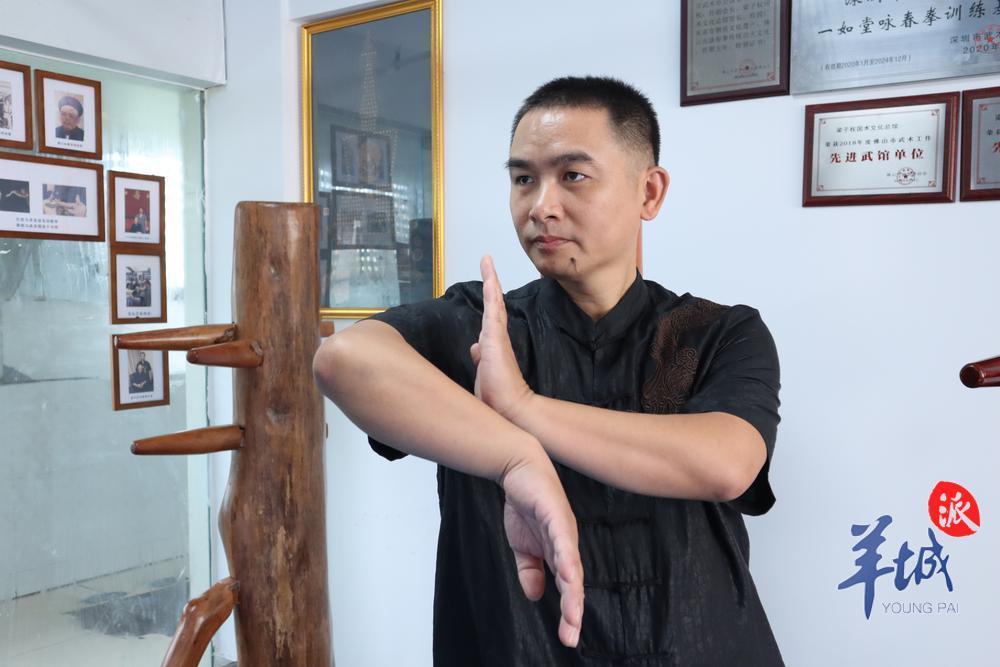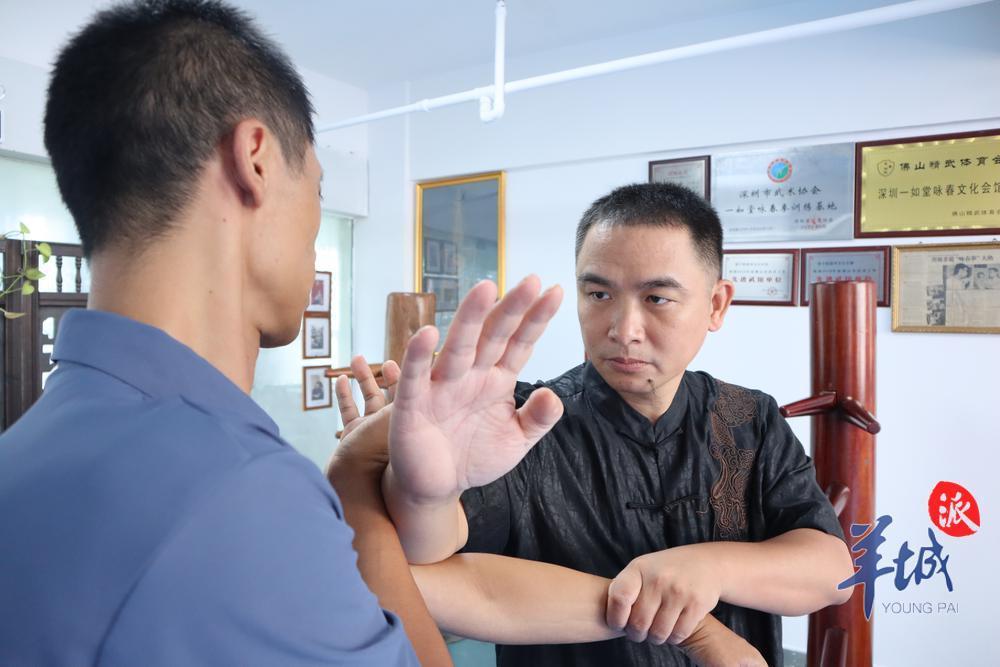
Wing Chun, a martial art originating from southern China, is renowned for its practicality, smooth techniques, and holistic training approach, with a history spanning over two centuries.
In February 2023, Wing Chun (Liang Zan lineage) was listed as the sixth batch of district-level intangible cultural heritage in Nanshan District, Shenzhen. In May, the dance drama "Wing Chun," produced in Shenzhen, graced the stage of the China Film Huabiao Awards, with Liang Ziquan, the fifth-generation heir of Wing Chun (Liang Zan lineage), serving as one of the martial arts coaches behind the scenes.
A connection to martial arts from birth: bound to Wing Chun at 17
Liang Ziquan was born in the renowned martial arts town of Guangning County, Zhaoqing City. "I was born into a family performing the Southern Lion Dance. I only started learning Wing Chun at the age of 17. In Guangning County, we have a tradition of performing the Southern Lion Dance during the Chinese New Year. This dance requires a foundation in martial arts. I have been practicing martial arts since I was young, and my passion for it runs deep."
In the summer of 1992, Liang Ziquan visited Foshan and was introduced to Wing Chun for the first time, sparking a strong interest in it. In 1995, he officially began his study of Wing Chun, setting him on a path of passing down the art.
In 1998, Liang Ziquan arrived in Shenzhen. In 2005, he established his own martial arts school, turning martial arts into his lifelong pursuit.

Exchanging experience for the continuous improvement of Wing Chun
Settling in Shenzhen provided Liang Ziquan with more opportunities to exchange and learn Wing Chun. His first tutor, Lun Jia, was a disciple of Yip Man in Foshan, while his second tutor, Huang Lang, was a disciple of Yip Man in Hong Kong. Liang Ziquan spent over a decade learning from each of them, gaining profound insights into the roots of Wing Chun in Foshan and Hong Kong.
"Foshan Wing Chun and Hong Kong Wing Chun have significant differences in training methods. Foshan Wing Chun movements are more refined, while Hong Kong Wing Chun forms are relatively more straightforward."
Over the years, Liang Ziquan has often led teams to Hong Kong for exchanges, always emphasizing the spirit of friendly competition. "Martial arts are not about violence; it's about preventing violence and using martial skills for defense. This is the essence of Wing Chun, and the most crucial aspect of friendly exchange is the spirit of friendship."
Preserving Wing Chun and promoting cultural excellence
"Northern Tai Chi, Southern Wing Chun. There's a significant difference between practicing Wing Chun in real life and its portrayal in movies and TV shows. Many people come to learn Wing Chun because of Donnie Yen's influence, but some might leave because they find it slow-paced." For Liang Ziquan, Wing Chun is not just a career or a passion; it's a heritage to be passed down.
Liang Ziquan believes that Wing Chun can be practiced in as little as one square meter of space, making it ideal for busy urbanites who can practice it on their balconies or in their offices, cultivating their spirits.
"My tutor, Huang Lang, often stressed that Wing Chun is an internal martial art, cultivating internal energy and spirit while also training the muscles and skin. Apart from teaching you self-defense skills, practicing Wing Chun makes your internal organs stronger and empowers your heart and soul."
视频丨咏春传承人梁子权:将传承传统文化当作一种生活态度
咏春拳是一种源自中国南方的武术门派,以简单实用、套路流畅、内外兼修等技艺特点著称,发展至今已有二百多年的历史。
今年2月,咏春拳(梁赞系)被深圳市南山区列入了第六批区级非物质文化遗产保护名录。5月,由深圳出品的舞剧《咏春》登上中国电影华表奖的舞台,咏春拳(梁赞系)第五代传承人梁子权正是该舞剧的幕后武术教练之一。

出生于武术之乡,17岁与咏春结缘
梁子权出生于著名的武术之乡肇庆广宁县。“我是南狮出身,17岁的时候才开始学习咏春拳,我们广宁县过年有舞南狮的习俗,而舞南狮则必须以练拳为基础,我从小就习武,骨子里就有对武术的热爱。”
1992年夏天,梁子权到佛山游玩,在这里首次接触到了咏春拳,并产生了浓厚的兴趣。1995年,梁子权正式研习咏春拳,从此,他在传承咏春拳的道路上越走越远。
1998年,梁子权来到深圳。2005年以后,梁子权成立了自己的武馆,正式将武术当作自己的事业。
加深交流切磋,持续改进咏春拳
在深圳定居后,梁子权获得了更多交流学习咏春拳的机会。他的第一任师父伦佳,是叶问早年在佛山的弟子;第二任师父黄朗,是叶问在香港的徒弟。梁子权跟随两位师父各学习了十多年,对佛山咏春拳和香港咏春拳的渊源体会颇深。
“佛山咏春拳和香港咏春拳在练法上有很大区别,佛山咏春拳的动作比较细腻,香港咏春拳的套路练起来则比较简单直接。”
多年来,梁子权经常带队到香港进行切磋交流,尤其注重点到为止,“练武不是暴力,而是让暴力防患于未然,止戈为武才是咏春拳的内涵,所以友谊切磋中,最重要的是友谊二字。”

传承咏春拳,发扬优秀文化
“北太极、南咏春,现实中的咏春拳和影视相比有很大区别,来练咏春拳的人很多,他们可能会因为甄子丹过来,也会因为咏春拳的慢悠悠而离开。”对梁子权而言,咏春拳不仅是一份事业、一份热爱,更是一份传承。
梁子权表示,咏春只需要一平方米的空间即可练习,阳台、办公室都能成为练武之地,非常适合城市中繁忙的人陶冶情操。
“我的师父黄朗常强调,咏春拳乃内家拳,内安精气神,外练筋骨皮。练习咏春拳除了教会你防身技能以外,还会让五脏六腑更加强大,同时强大你的内心和灵魂。”
文、图、视频丨羊城晚报全媒体记者 李艺戈 颜业宏 实习生 陈婕
翻译丨刘佳慧
视频加工丨潘俊华
责编丨古司祺
校对丨桂晴
-
Good Service and Rich Activities for Foreign Athletes to Reap Joy and Friendship in the FISU Games Village
2023-08-04 23:14:33 -
Bonded aviation supplies through Guangzhou Customs exceeded ¥3 billion in first half 2023
2023-08-04 23:14:27 -
Video | On site: Relief efforts underway as heavy rains displace Hebei residents
2023-08-04 23:04:35 -
19 Guangdong Enterprises List on Fortune Global 500
2023-08-03 22:44:12






